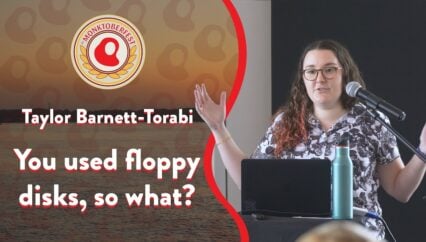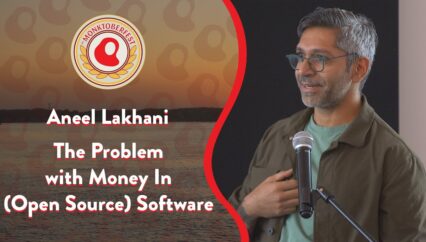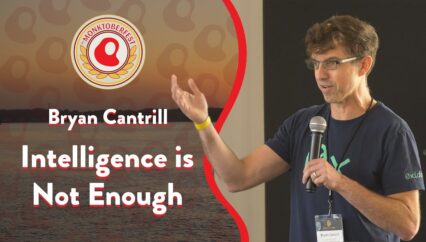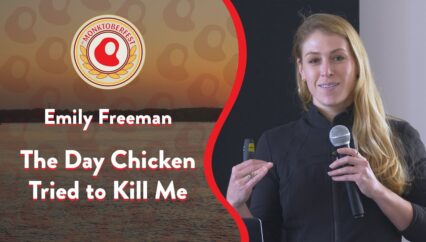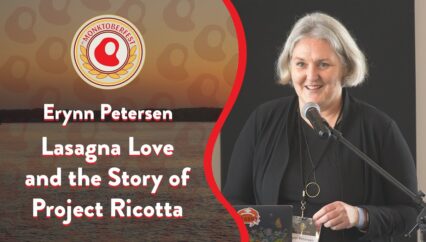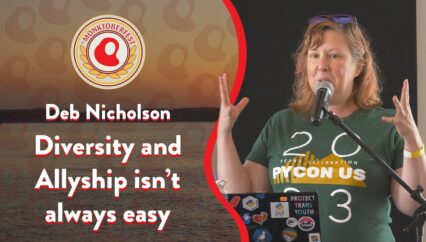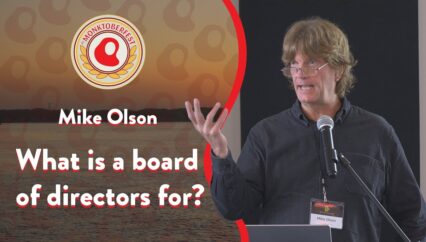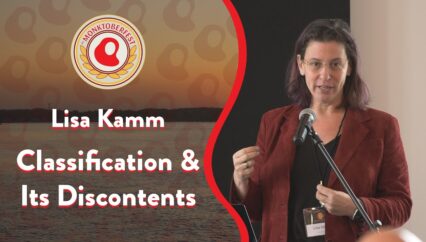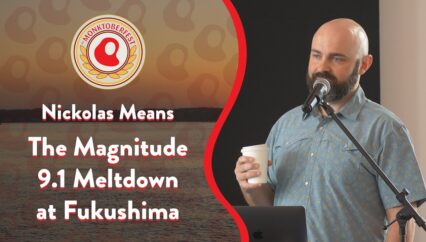This talk aims to address the role of language in shaping the dynamics within technology teams, particularly focusing on how certain lexicons can reinforce hierarchy and top-down thinking in engineering team management. By examining commonly used phrases that imply ownership, such as “my team” or reference individuals possessively, as well as terms like “head count” that depersonalize team members, this discussion highlights how language choices can be exclusive, disempowering, or dehumanizing. The talk will advocate for a shift in perspective, viewing management as a role rather than a specific individual. This approach is intended to foster a less hierarchical environment, encouraging a sense of agency among team members and empowering them to actively contribute to the team’s mission. The goal is to rethink and refine the language used in technology management to promote a more inclusive and collaborative team culture.
Transcript
OK, all right, this is called There Is No My In Team. Towards a More Collective Management Culture. And thank you all so much for accepting the talk. To get up here and platform an idea that we’re really passionate about. I’m really excited to be here at Monktoberfest. This is my first time to the conference. I will try not to get through the talk in 12 minutes. I promise you it’s not a 12-minute talk so if I need to slow down just yell at me.
So I want to talk about a topic that as mentioned occupies way too much of my brain space, so before we get started. Want to talk about who am I? My name is Armand Emamdjomeh, I’m an engineering manager at the Washington Post. Before I joined the engineering department, I worked in the newsroom as a reporter and assignment editor on the graphics desk for several years.
So your first question might be: What is a news engineering team? No, we don’t engineer the news.
Hahahaha. We build tools for reporters that help us be a force multiplier for the data reporting, graphics, news design investigative and other teams that produce some of the Post’s most impactful storytelling efforts. And enables reporters to focus on producing high-quality distinctive journalism. Our former director who’s also an attendee at this conference likes to refer to it as the liminal space. We actually have some liminal space stickers.
And I really like — we’re not actually dealing with scope creep here. We’re just really focused of playing the game over Zoom. Because we’re just like drawing on our computers, but I thought it was a good image of some of us and how focused we are. And as you can probably tell from the Zoom screenshot, we’re also a team that works primarily remotely.
If you feel that in-office work is the only or best way to be doing the type of work that we do, we should probably talk. I don’t think we really reached the end of history in the way that we work, so you know, I think there’s a lot to learn from.
So anyways, what are we doing here?
So I work as a manager now, first I worked in graphics at the Los Angeles Times and then now now I’m an engineering manager at the Washington Post. I’m interested in language in general. An idea for this talk I developed from the language how how do the words we choose to use from a position of implicit power reflect how we see that power?
How does my choice of words affect me as a manager and how do affect you as a coworker?
Words have power and whether we intend to do so or not, the words we choose to describe ourselves, our roles and people we work with, they have meaning.
And before we dive in, this is a disclaimer: This is are just any kooky ideas. There’s many alternatives. Also I’m not an academic and unlike database stories that I’ve worked on, there is no dataset here that I’ve worked with, other than my own anecdotal experience and this is mostly vibe space, this is a vibe space analysis.
And one last caveat. I don’t think we should assume any malicious things from anyone who uses any of the word choices highlighted here. We want to assume good intentions. This is a rare common and pervasive habit and I just think most people never thought about it or maybe I’m the one who’s thinking too much about it.
Anyway, so let’s do some goal-setting. My goal for the talk is to share how we use language can help us consider your management and your job as a role. And you’re not a title. Well, your job has a title and maybe it’s a very fancy one. You might be manager of interactive widgets or VP of mucky muck. That does not I will you authority. It doesn’t I will you to very much of anything.
We want to reduce top-down thinking, where there’s a single ladder at the top of the organizational pyramid and everyone else doesn’t really matter. It’s that person at the top’s world and we’re just living in it. We want to empower both individuals and the collective. It doesn’t need to be zero-sum. We can be stronger than this together.
And understanding the impact of some of the language we use. Our words can also lift up and they can also bring people down. I want to focus on the former.
OK. Goal set.
Let’s talk about focusing on the role and not the person. Let’s say you’re a new manager. congrats! You were probably promoted because you were really good at your job, someone says, hey, what if instead of doing this job, you were in charge of other people doing this job. Guess what? That’s not the same job! And another note, you’re also pretty likely to be bad at it first. As a new manager you’re likely to make lots of mistakes. I’ve learned a lot by stepping on rakes, like Side show Bob over the years.
But to the talk. Anyways, the job since it’s new, you may not be any good at it. Meanwhile, the job isn’t about your work anymore, so why shouldn’t that be reflected in your language.
The first term I want to focus on is very simple. One we probably don’t even think about. And it’s the word “my.” So this is incredibly ingrained in our culture. If you’re lucky enough to have had some sort of training or read books on management, they’re likely to talk about your team. If you haven’t received any formal training and most of us haven’t, you’re probably going to adapt the language of those who model around you. This is how we learn. And we end up with terms like my team, my engineers, my staff.
Now, “my” is a simple modifier that denotes possession. To say my, when you’re in a position of authority, you’re implicitly taking possession of the object that you’re referring to, whether you’re aware of it or not.
But a team consists of people and implying that people belong to you, which is what’s happening when you say my team or my leads or my engineers, or this one really kills me: “My interns” isn’t that a little bit weird? And as you’re saying” my “whether you’re aware of it or not, can we see how that can enable toxic behaviors. It makes those asks to buckle down, do the impossible, just a little bit easier. If you’re asking people who belong to you anyway, even though I feel like a lot of the time, if you’re asking a team to do the impossible, it’s because someone or someone else has failed along the way. And sometimes maybe it was you.
Meanwhile, how does it affect people to hear how you refer to them as belonging to you? To hear that you’re lead or your engineer or something that I would hear when I was in the reporting context, like, your photographer.
When you were the reporter on a story. How does that limit someone’s agency?
OK, let’s get back to you. This has the effect of making it about the person in charge. You know, what they do. Not what the team wants or does, or even necessarily sometimes what the organization wants.
How does this have an effect on the rest of the organization? If teams are routinely conflated with a person, what happens if that person leaves? So what happens if a person leaves, I feel like that’s something you should always be thinking about. Does the team have a purpose? Or does it all just fall apart when they leave? And if it does, maybe it’s because the structure never really made that much sense in the first place.
Maybe skills or knowledge to keep the team running were all siloed in one person. You know, that person, maybe you. And what I hear sometimes is yes, this is — you know, this is just a linguistic shortcut, and yes, it is, it’s a linguistic shortcut, but if everyone else is referring to your team or Janson’s team or Manuel’s team, even if it’s shorthand, the emphasis gets taken off the team and on to them as a person. At some point does an organization even know what these teams are or what their mission is.
The only is when you use my, your, or armed’s team, the use of singular possessive is *exclusory by nature. And you might say we use these terms deliberately. We want to empower you. We want to create feelings of ownership. We’ll talk about ownership later.
And it’s right. You know,
My position is this comes specifically at costs of empowerment or agency by others on the team.
And I don’t think we have to look too deeply to have some insight into how this usage came about. You’ll often see quotes from military leaders who refer to my men and there’s a lot of explicit sexism in these terms, and of course plenty of instances in pop culture. Like this one.
And with all respect to General Patton or the first duke of Wellington quoted here, using the language of military leaders, is that really how you see yourself, like, your role? An anyway, aren’t we trying to move away from the great men of history mindset? If that’s what you want, there’s many other ways.
And you know, I’ve thought whether this is something — this is like gender-based, whether you know, this is more common among men or among women, I don’t know, I’ve — I feel like I’ve seen it in literature, I’m just not sure — this is very limited dataset that I’m working with here.
And I thought, maybe that’s just a way that large parts of the organization in larger companies get simplified and this is not a large dataset that I’m working with.
But how can you have an effective organization if you essentially have people running what they see as like their own small fiefdoms?
So, let’s say you agree with me. I hope you do. But it’s such a handy term. I don’t really know what to say instead. So what’s like a more inclusive team? I like to say that I run the team, but it’s not my team, and so I run, really, I hope to run, the lead — the engineering leads do a tremendous amount of work, the interactive news and news application teams at the Washington Post.
In other cases where that’s inconvenient or too funky, you can try replacing “my” with an “our.” So our team is working on, or we’re striving towards, etc., etc.
Or you can try asking yourself, you know, what the team or the part of the organization that you oversee does. Is there a connecting thread here? Is there an overarcing story line? That shouldn’t be the first thing at the top. It should be a mission. And if you don’t have a clear answer, maybe that’s a good opportunity to spend some time on organizational mission and goal-setting.
Do this collaboratively. Do this with the team. You might be surprised with what you come up with.
When all this fails, just say the name of the team. It helps to reinforce the team’s purposes in the organizational structure both in your mind and in the minds of the people that you’re speaking to. Reinforcing team purpose is generally a good thing.
So anyways, what are we getting at here? Hopefully this moves us away from a place where we think of a manager as an authority power, someone whose power is vested in them by the nature of the job.
What if instead the first thing we thought of when we talked about a manager is someone who is a facilitator or someone who empowers. So a manager who’s not taking possession, but instead ensuring teams have what they need to thrive.
And that the team has what it needs to get the job done.
All right, the second one and as a note. I feel like these get a little bit spicier as they go along, so please bear with me.
So that ises word owning or ownership. So speaking of taking possession, owning, ownership, dovetails nicely with this. Another term that connotes possession. So these are typically used in different contexts.
One refers to a direct-line responsibility. And ownership is more of like a concept.
I find them both a little bit strange when they’re used in flavour context. So with the context of my as I said before, it seems like there’s good problematic historical refer of historical leaders referring to my, you know, X. But when did this concept come about? I went down a little bit of a rabbit hole here. Because I really wanted to know. People started saying this. So I’m going to take you with me. I did a little research to see if I could get a ooh sense of the usage of the term ownership. I started with the broadest sense. Here we can see rise late 19th, throughout the 20th Century, sharp increase seemed to be around 1970, peaking in 2000.
So I thought that was a good start, but I looked up employee ownership, thinking that would be more fruitful. After all, isn’t that what the phrase is trying to do? Like cultivate feelings of ownership among employees? So I thought that was really interesting. And when I looked at the references, many of them refer to actual employee ownership of a company, whether that’s in shares or more cooperative form. So usage appears to peak around 1927, I thought that was really interesting, only returning to like the 1980s, to around 2000.
So I wondered what is the term I’m really looking for. Taking ownership. Maybe it took me way too long to get here but anyways, I can think — I couldn’t think of any instances of take ownership from the early 20th Century. So what happens if I search for that? So I thought, aha!
So looking at this chart, this makes me think that there is a book or something written in some sort of seminal piece of literature? Like, this is — literature that really caused the usage of the term to take off.
I couldn’t figure out what it was. So if any y’all know what it could be, I would be really interested to know that.
Yeah, please let me know.
And then rhetorically, when we say take ownership, what are we asking you to own? What is it that you’re owning?
All right, I have one more chart here and I just find it really interesting that employee ownership declined just as take ownership is skyrocketing in use. I don’t know if there’s direct correlation or if there’s causation here, I just find it interesting.
And as for owning, this is one of my favorite questions. I also find the usage really strange, like, do you own this database? Do you own this? For questions like who owns a database, or who owns a section of work, what is it that you’re asking? What are you implying? I might being a little too pedantic here, but I don’t own anything from work. Our infrastructure is all rented from AWS. This is my Washington Post computer. If I leave the company, I shut it off, I never think about it again. The database I theoretically own, I never think about it again. I don’t own it. Somebody else — it becomes their job. I’m responsible for it. I take that really, really seriously, I do not trivialize that.
We’ll get to that in a minute. But I just think, isn’t it ironic that we’re asking people to take on or own parts of our business without giving them any actual stake in it in a lot of cases? For instance, you’re asking people to own their work and I live in Washington, D.C. It is one of the most expensive housing markets in the country. And before that I lived in Los Angeles, again, one of the most expensive housing markets in the country. In many cases you’re asking people to own their work, but you’re not paying them enough to own like a house or even an apartment or a condo in that city. And you’re asking them at the same time to own their work. That doesn’t feel right to me.
So with one caveat. You should own your mistakes and it’s surprising how many times people don’t feel like they should own their mistakes.
So when someone owns something as a concept, yes, they’re accountable for it. The term ownership also comes with notions of exclusivity, territory ality.
If you have * that person can be a guardian or a steward and that’s good. That person could also be a gatekeeper, which is, you know, obviously bad.
So what if in this case again we steered away from the language of individual ownership and instead emphasized something that connotes collective responsibility?
What if we used other words instead? What would those words be? , you know, responsibility, like, who is responsible for this? It’s hard to say. Accountability, who’s accountability for an outcome. If you’re referring to a process, instead of saying who owns the process, how about who facilitates or who champions it? And again we’ve gone over a couple but I want you to think of what other terms we might be using that are intentionally or unintentionally disempowering or exclusionary.
For me, another one is heads. These are people. I don’t like abstracting people into head count and then think about what we can do to change that and how can we use language that instead, equalizes and shares power among team work members? You know, increases engagement or responsibility, and promotes psychological safety.
And doesn’t centralize, but instead shares power.
And in the end talks about people.
One last thing I’m going to discuss, again, it gets a little spicier as we go along. You know. this one is usage of word leadership. This might be the last straw. Please bear with me here. Sometimes we say leadership when we just mean managers.
So by the way, … I’m not from the Northeast, I’m sorry. So this statement refers to the organizational form of leaders on the org chart, yes, it does. But it also refers to leadership as some sort of abstract organizational entity. This is the entity with decisionmaking power and that’s isolated from those with no decisionmaking power.
So it’s the people at the end of the long concentrated power — by the way, I hate when people do this: You know, like what if instead of having a long conference table with everybody with power at the end, all the decisionmakers, the editor of the paper, the managing editors, what if instead, you just scattered those positions around the table and had the top person sit in the middle, like the middle of the widest part of the table instead? You know, how would that affect people’s discussions and how people talk about a topic? I feel like we’ve all been at the far end of the table or at a seat at the far edge of the conference room struggling to listen in on what’s being said but the problem is the two people are sitting right next to each other so they’re not speaking very loudly. So that sucks. I hate conference rooms.
Anyway, leadership means, leadership discusses, leadership decides, that’s how it is, right? So you might be exhibiting leadership but are you really exhibiting leadership? Instead, I think leadership is a behavior. It’s an influence operation and we heard that earlier today. You know, if you have to use force or the weight of your authority to compel people to do something that they don’t want to do, you’re already failing. And what’s more, leadership can and should, you know, again referring to the talk earlier, like it can be exhibited by anyone in the organization.
I’ve seen interns exhibit more leadership and do more to exhibit positive change in an organization than I have CEOs, and I hope everyone on the team feels the opportunity to exhibit leadership or to be a leader, even if you are an intern or a new hire on a team, propose something new, tell me what you’re doing wrong, you know, fresh perspectives are an asset and if they don’t feel the opportunity, if they don’t feel the trust there, if they don’t trust me to be able to bring something up and discuss, like, changes, then I consider that a failure on my part.
So management is a role, and even Capitol Hill leadership, that’s not an entity, but you know, that’s a set of behaviors.
Yes, you should exhibit leadership as a manager, you know, that’s a lot of times part of the job. And also, it’s a yes, and. Everyone is capable of exhibiting leadership in an organization.
So what are some examples of these behaviors? How about, you know, organizing celebrations, even small ones, like making sure someone has a little treat on their birthday, like a little baked good or something. Or going out of your way to mentor somebody that you know is struggling and making sure that they have what they need.
Or starting an initiative, like a weekly meeting where people can come, they can share coding challenges with a larger group, like, whatever team they’re on, you know, newsroom, engineering, whatever department.
Or cultivating an expertise, but not just satisfied with that. Creating documentation. And creating a process. Sharing the skills with teammates. All of these are real-world cases that I’ve seen.
And the cases just go on and on and on.
And one of the most dangerous concepts when you’re managing an organization or a team of any size is just accepting things as they are. You know, thinking that because they are that way, that’s how they should be. I’m guilty of this, you know, it’s dangerous to accept things, that we’re at the end of history for how we work. It’s a dangerous concept.
And to accomplish this, I try to incorporate things. If things have always been the same way, what if if they weren’t. Four years ago, already working in that context, who would have thought so much would have been possible on a distributed basis? What are ways we’ve adapted to accommodate in ways that we would have never imagined? Or if we’re resistant to an idea because it’s never been done before, just ask why not? Why is that the case? Do that reflection within yourself. In a lot of cases what do you have to lose by trying? The majority of the time the stakes aren’t life and death, so just give it a shot.
Back to leadership, I think the term leadership and everything else I’ve mentioned here, it all comes back to this: Not just making sure that others can follow your path, but just — but also making sure that they feel empowered to chart their own and know that they’ll have your support and your trust in it. And maybe, just maybe trying to make the organizational structure a little bit less wrong.
And that’s it. Thank you.
[applause].
